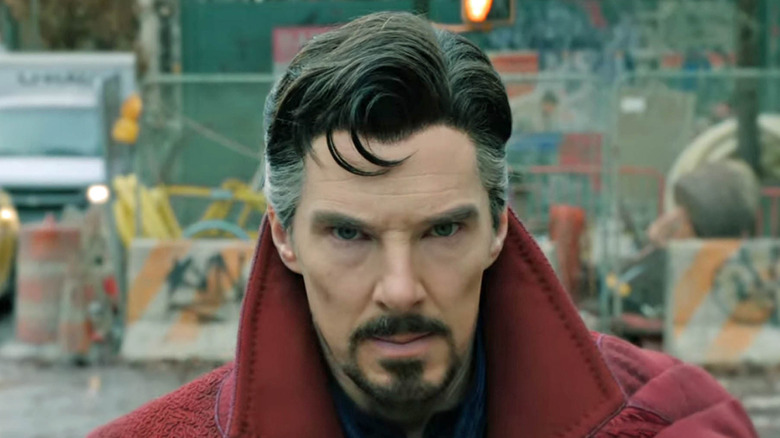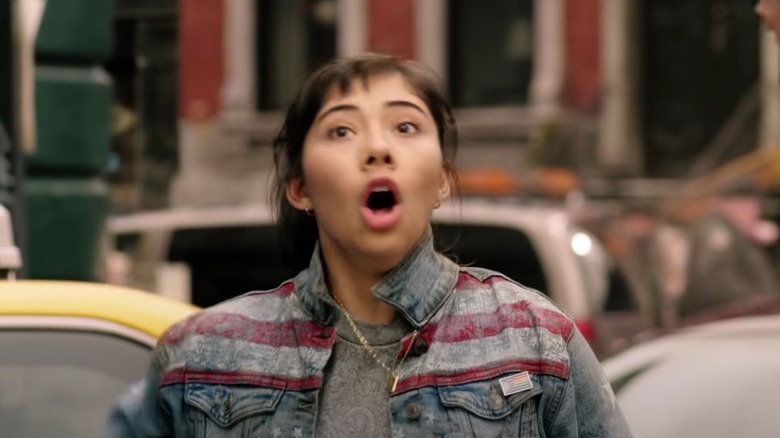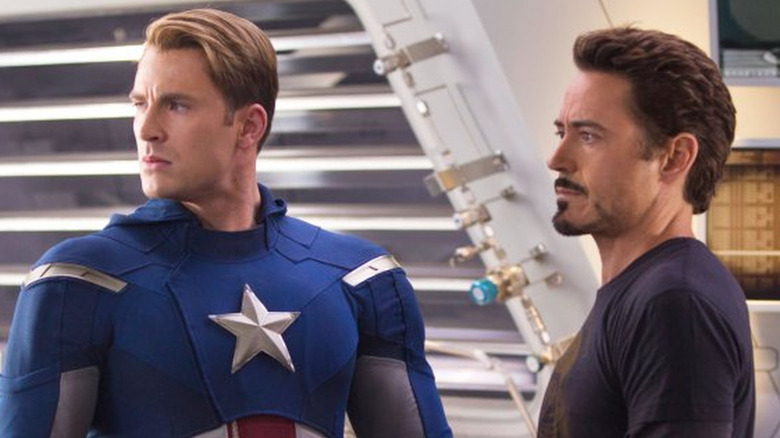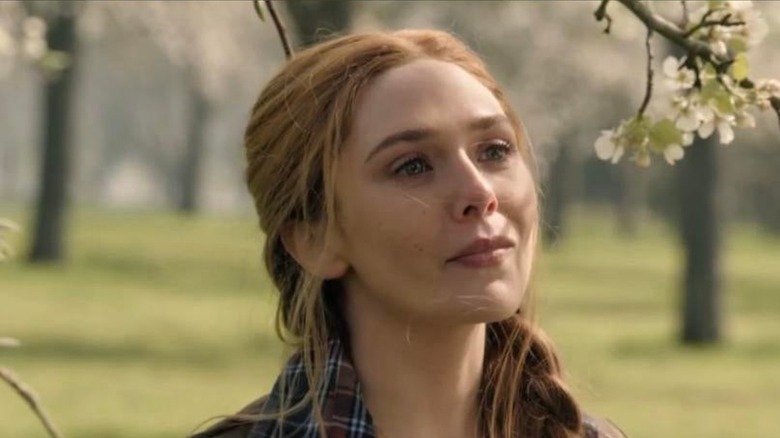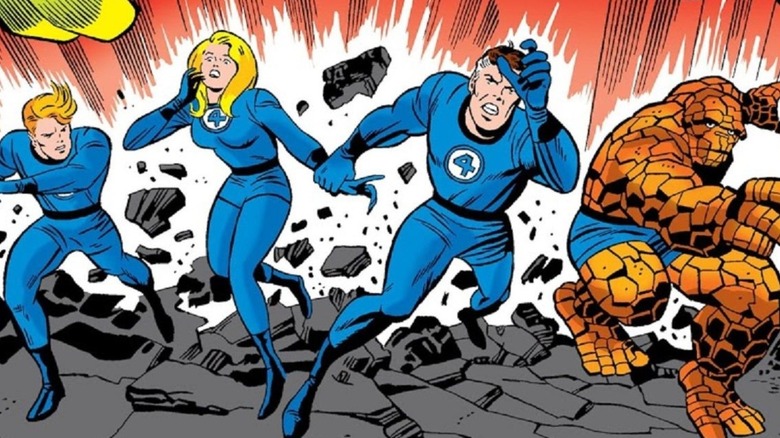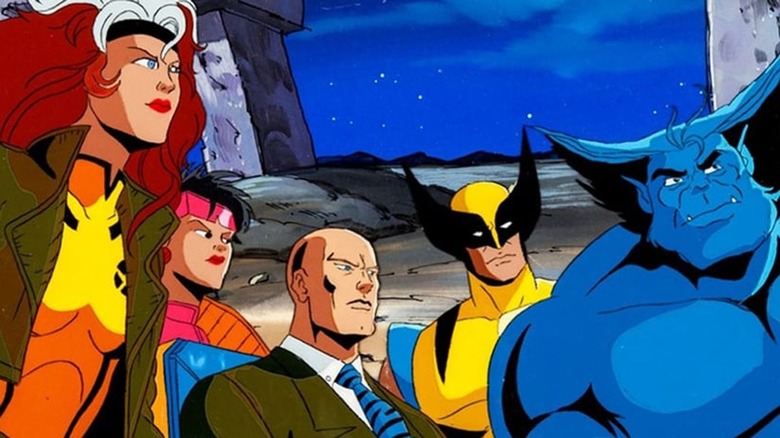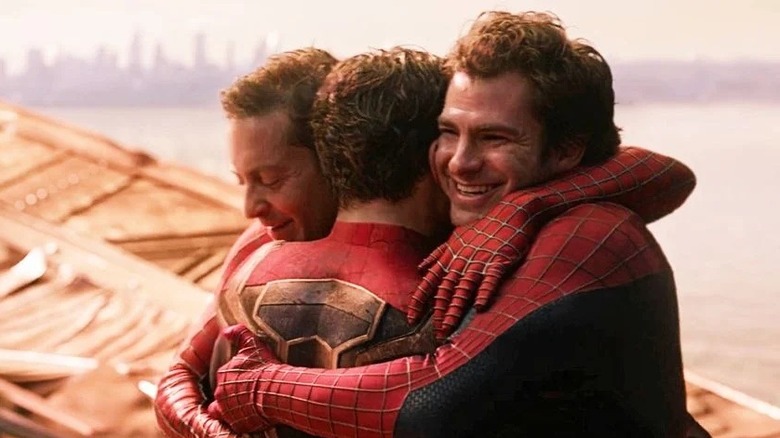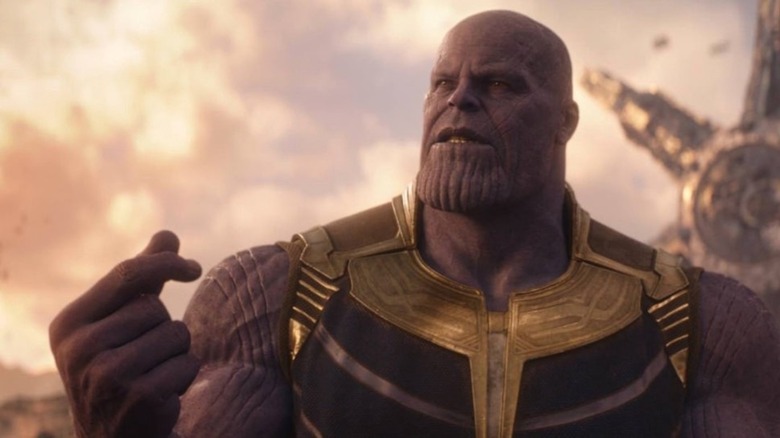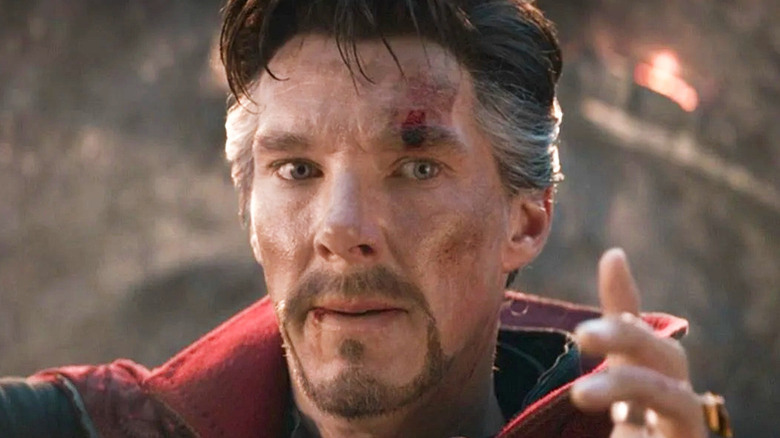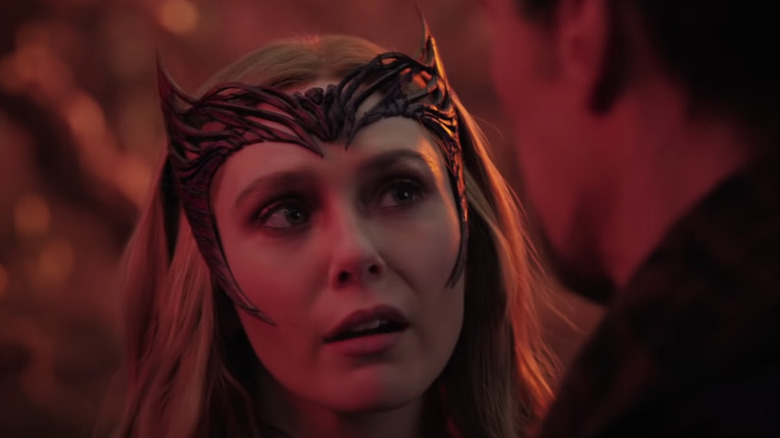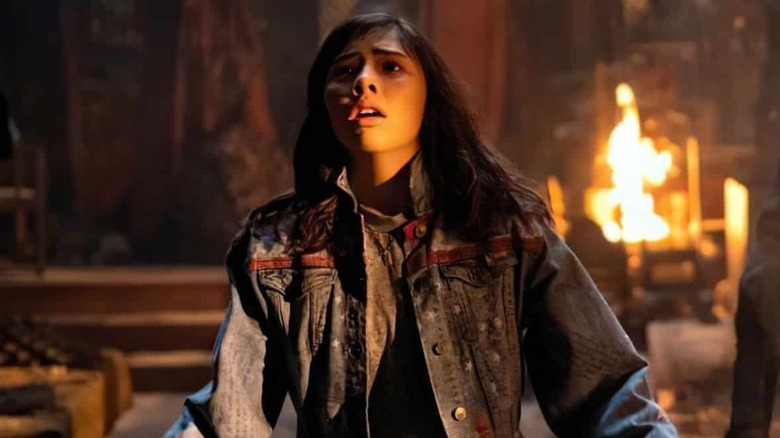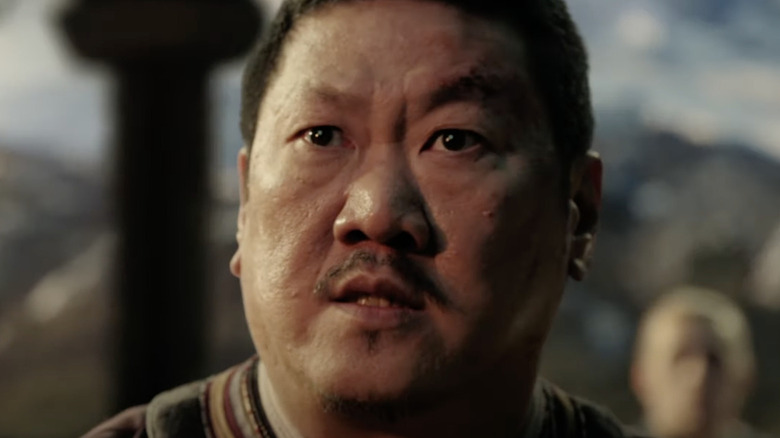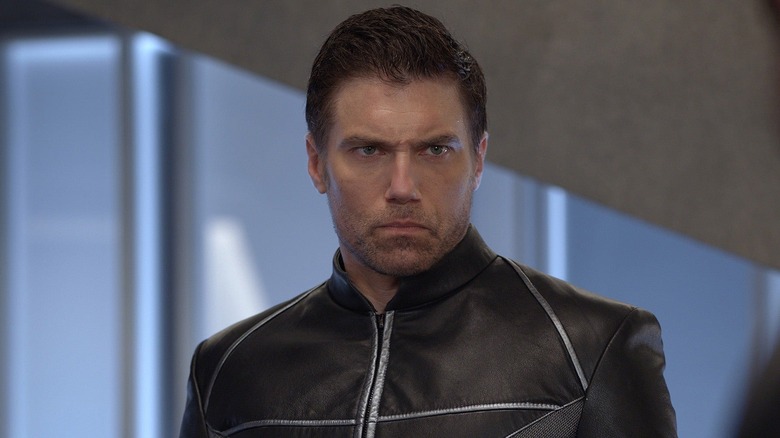Things Only Adults Notice In Doctor Strange In The Multiverse Of Madness
Forget all the rules of comic book movies, because "Doctor Strange in the Multiverse of Madness" showed that anything is possible in the Marvel Cinematic Universe. From unexpected cameos to universe-rippling effects, we don't need a third eye to know that the only constant from here on out is change.
Directed by Sam Raimi and starring Benedict Cumberbatch as Doctor Strange, "Multiverse of Madness" lived up to the promise of shifting the status quo and turning this cinematic universe onto its head. It wasn't only a mind-bending journey through the past, present, and future of the MCU, but it also traversed across different film genres such as action, science fiction, fantasy, and horror. With so much happening in its two-hour runtime, it's often easy to overlook some strange moments and story threads that only pop to mind long after the credits have rolled.
Now, we're not looking to cause any new "incursions" in the Multiverse or pick apart narrative choices, but these are just a few of the interesting and odd things that we couldn't help but notice in "Doctor Strange in the Multiverse of Madness." Be warned: Spoilers ahead.
How has America Chavez not heard of Spider-Man?
The one thing that was abundantly clear about America Chavez in "Doctor Strange in the Multiverse of Madness" was that she had seen a lot. Having travelled across the Multiverse, she had visited 72 universes (via Marvel), even tasting all the different culinary delights along the way. However, there was one superhero she had failed to encounter or even know anything about during her adventures: Spider-Man.
While most people might point out that it's because of Doctor Strange's spell at the end of "Spider-Man: No Way Home," that's not an entirely correct assumption. Strange's spell made everyone forget that Peter Parker existed, not Spidey. Even Happy Hogan confirmed to Pete that he knew Aunt May through Spider-Man at her gravesite. Taking into account the three Spider-Men that appeared in "No Way Home," plus all the others introduced in "Into the Spider-Verse," what are the odds that America only visited universes without any spider-themed heroes or variants? No Miles Morales? No Miguel O'Hara? No Spider-Gwen? Hmm ... This is starting to smell a whole lot like a gigantic plot hole.
The whereabouts of Tony Stark and Steve Rogers
Comic books are basically soap operas with superheroes. Like soaps, the rules of life and death aren't applied consistently. No one is ever truly gone and there's always an event that's ready to give some fallen hero (or villain) a resurrection à la Stefano DiMera. Due to this, there was always the possibility that Tony Stark and Steve Rogers could have returned in "Doctor Strange in the Multiverse of Madness." Rogers, of course, isn't dead in the MCU, but retired and enjoying bingo on Sunday afternoons.
What didn't make sense in "Doctor Strange in the Multiverse of Madness" was their notable absences in the Multiverse. As shown by Peggy Carter becoming Captain Carter in one universe, there was never any guarantee that Rogers or Stark would become Captain America or Iron Man respectively. That's fine. However, judging by how each universe's Stephen Strange appeared to have become a sorcerer, the chances were always high that Stark and Rogers' paths would have led them to become important figures in their own right, too. Yet, they didn't show up. Not even once. Where were they in the other universes?
The Avengers weren't there for Wanda
Wanda Maximoff experienced a heartbreaking and life-changing moment when she removed the Mind Stone from Vision's head, which was a vital part of keeping him alive. Then, she had to suffer the pain and loss all over again, as Thanos reversed time and destroyed the android once more for good measure. These events can change someone, and they did as seen by Wanda's behavior in "WandaVision."
While we cannot condone Wanda's actions or methods, her former teammates hardly made any effort to provide her comfort during her period of grief. Sure, everyone experienced their own losses after Thanos' snap and had a lot to deal with, but no one attempted to even be a shoulder to cry on for Wanda, even knowing that she'd lost her brother, Pietro, and then the love of her life. In all likelihood, Wanda might have pushed them away, but at least she would have known they cared about her. Ultimately, she was alone and this led her to the Darkhold and the path of trying to create a family to deal with her trauma. With friends like the Avengers, who needs enemies, right?
The Fantastic Four were awfully quiet when Thanos attacked
Undoubtedly, one of the hottest cameos of "Doctor Strange in the Multiverse of Madness" was the appearance of John Krasinski as Reed Richards/Mister Fantastic of Earth-838. While social media might have spoiled the big reveal because Film Twitter cannot contain itself with secrets, it was still an exciting moment, as it announced the official arrival of the Fantastic Four in the MCU. The rest of Marvel's First Family didn't show up, but it was more than enough to lay a solid foundation for the impending film.
With the confirmation that the Fantastic Four exists, it leaves one major question here: Why didn't the Earth-616 version of the team try to stop Thanos with the Avengers? Yes, Krasinski's Mister Fantastic was from a different universe, but there must be other versions of the Fantastic Four sprinkled throughout the Multiverse. Are we meant to believe that Reed Richards — one of the world's greatest minds — didn't have anything to add and chose to stay at home in the Baxter Building while the rest of Earth's heroes battled Thanos' evil forces? Maybe we'll get more answers in the upcoming movie.
X-Men: The Animated Series might be canon in the MCU
Much like the comics, no one really knows what's canon when it comes to the X-Men anymore. That timeline has undergone more revamps and reimaginings than "Extreme Makeover: Home Edition." Without a doubt, the MCU will try to remedy this situation with the Children of the Atom becoming a part of the greater Marvel Universe, and the first step was introducing the Earth-838 version of Patrick Stewart's Professor Charles Xavier in "Doctor Strange in the Multiverse of Madness." While Stewart's Professor X was from Fox's X-Verse, there are a few hints that he may be the mutant from another popular incarnation of the X-Men.
When Professor X appeared in the film, he glided onto the screen in the recognizable yellow hover chair from "X-Men: The Animated Series." Additionally, he wore a green top to match the character's design from the cartoon. However, the biggest a-ha moment was when a hint of the classic theme song from the animated show played in the background. Of course this could be a homage or merely fan service for long-time supporters of the mutant superheroes, but wouldn't it be a novel idea if "X-Men: TAS" ends up being the backstory of the MCU's X-Men? With the animated show returning as "X-Men '97" on Disney+, don't bet against it.
The Multiverse logic is highly questionable
The fact that the title of the film includes "Multiverse of Madness" is a good indication that not everything was meant to make sense here. However, there was one glaring issue that cannot be overlooked and created more confusion than answers. Remember "Spider-Man: No Way Home" and how it brought all the Peter Parkers together? While it was fun to hear MJ and Ned call Peter and for all of them to respond at the same time, it was evident that all three Peters looked different and were distinguishable from each other.
So why did the variants of Stephen Strange, Christine Palmers, and Scarlet Witches all look the same in the Multiverse? Apart from a different haircut or attire, it was easy to spot who they were and it made them instantly recognizable to people from other universes. Using this logic, all three of the Spider-Men should have looked like Tom Holland's version of the character. Naturally, this new logic could be a result of Doctor Strange's spells having adverse effects on the Multiverse, but it still seemed peculiar how America Chavez, who had been traversing the universes for some time, didn't mention anything about it. Between Loki and Doctor Strange, they really created havoc on the timeline, making Barry Allen's The Flash look like a saint in comparison.
Another Thanos exists out there
In Earth-616, Iron Man sacrificed himself to end Thanos' reign of terror. In "Doctor Strange in the Multiverse of Madness," it was shown how the Illuminati also brought down the Mad Titan in their own world. Connecting the dots, this points to one significant conclusion: There are multiple versions of Thanos throughout the Multiverse and they're all likely hungry for power.
As portals have been opened and people have zipped in and out of the different universes, what are the odds that another Thanos hasn't slipped through the cracks as well? With his brother Eros/Starfox being introduced in the post-credits scene of "Eternals," he will need a formidable foe, and who is more formidable than the Mad Titan of his family tree? A villain as big and monumental as Thanos doesn't just go away quietly after one rumble. He may be laying low and licking his wounds, as he plots his revenge on Earth's Mightiest Heroes and prepares to strike once again.
Why didn't Doctor Strange call the Avengers for backup?
Previous MCU films demonstrated that Wanda Maximoff was a powerful character. However, as the Scarlet Witch in "Doctor Strange in the Multiverse of Madness," she showed off just how OP she really was. Not only did she wipe out Captain Carter, Captain Marvel, Reed Richards, and Black Bolt on her own, but she also wiped out the army of Kamar-Taj without breaking a sweat. Forget about great power and great responsibility, because when someone holds the potential to get into people's heads and snap them like they're twigs, it's best to put pride aside and call in the heavy guns for help.
For some reason, though, Doctor Strange didn't do that. He knew that Scarlet Witch was heading to Kamar-Taj to collect America Chavez, and she had already told him her demands beforehand. Yet, instead of phoning up the Avengers and asking for some superpowered backup, he decided to rely on magic students as the frontline of defense. Perhaps Strange underestimated his former colleague, but he could have at least called up Jimmy Woo and Darcy Lewis to find out how much damage the Scarlet Witch had caused at Westview. Maybe then he wouldn't have been so reluctant to seek out major assistance in the first place.
Scarlet Witch was right to point out Doctor Strange's hypocrisy
When Doctor Strange tried to reason with Scarlet Witch about the severe consequences of messing with the Multiverse, she turned the tables and pointed out how it was deemed acceptable when he did the same. She wasn't wrong. While there was an element of whataboutism in her response, she raised a valid point about Strange's double standards. In "Spider-Man: No Way Home," Wong warned him about what would happen, but Strange didn't heed his warnings. Instead, he opened the world to possible new threats because of a request from Spider-Man.
While it was undoubtedly sad that Spidey's true identity was exposed to the world, Strange was prepared to risk the safety of the entire universe to reverse a single event. Surely, there were other solutions here. Even if it meant that Peter Parker would have to hide out for a period of time until they figured it out. Yet, the first port of call here was magic — the kind that creates seismic rifts in the universe. While Scarlet Witch wasn't right in wanting to sacrifice a person for her own delusion of personal happiness, neither was Strange, who was prepared to risk an entire world for one person.
Doctor Strange didn't help America Chavez find her parents
During a moment of exposition in "Doctor Strange and the Multiverse of Madness," there was a scene where the audience saw America Chavez as a child with her mothers. It was also the exact point where she uncovered her powers for the first time and opened up an interdimensional portal that sucked her and her parents into it. America told Doctor Strange that she feared she was responsible for their deaths, but Strange replied that they must be alive somewhere in the Multiverse.
At the end of the film, America once again mentioned to the sorcerer that she will find her mothers one day. Strange said goodbye and headed back through the dimensional door to the Sanctum. So why didn't the good doctor offer his assistance to America? Yes, there are numerous universes in the MCU and they could be anywhere, but the least he could do would be to offer some advice to America of where she should start looking. Instead, he went back home to fix his watch and left the girl as an orphan. Moral of the story: Don't expect Doctor Strange to help anyone find their wallet and keys if they lose them.
Wong deserves more respect
From what we have seen in the MCU, Doctor Strange has never been what one would call a "people person." He can come across as prickly and even condescending to others, depending on the mood that day. However, he displayed a lot of initial disrespect to Wong in "Doctor Strange in the Multiverse of Madness." When approaching the Sorcerer Supreme, there were certain formalities that needed to be adhered to, such as bowing before him. For Strange, he didn't do this for the better part of the film, only doing so in the end.
It was surprising to see Strange behave this way, since Wong had not only been a friend, but also the person who assisted him in studying the Mystic Arts. He had a wealth of knowledge and even knew important concepts about the Multiverse that Strange had no idea about. Much like "Spider-Man: No Way Home," Strange didn't listen to Wong when he really should have. Hopefully, his change in demeanor at the end of "Multiverse of Madness" signified that he would be taking Wong and his position as the Sorcerer Supreme much more seriously in the future.
The Inhumans don't suck after all
Out of all the characters from the previous Marvel films and TV shows, who would have put money on an Inhuman showing up in "Doctor Strange in the Multiverse of Madness"? Lest we forget, the "Inhumans" TV show holds an 11% critical approval rating and 44% audience score on Rotten Tomatoes. After all the ridicule and bad press, one would imagine that Kevin Feige would have sent the Inhumans into the darkest part of the Multiverse, never to be seen again.
Yet, Anson Mount returned as Black Bolt in Sam Raimi's film. This time, however, he was kitted out in a comic book-accurate outfit and portrayed as more of an omega-level threat than what was seen in the series. Like his comic book counterpart, no one wanted him to speak a word, knowing that a single whisper could decimate anyone around him. Equally important here, "Doctor Strange in the Multiverse of Madness" proved that there could be life and a future for the Inhumans in the MCU. They might have had a rough time on the ABC show, but they could still play an important part in Marvel movies going forward. Maybe Mount may return as Black Bolt for a third time, ensuring that Vin Diesel's dream of playing the silent superhero never happens.
